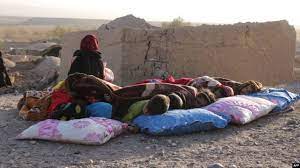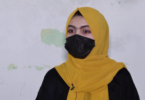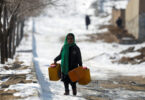HERAT (Khaama Press): The Herat earthquake’s devastation is a tragedy beyond words. Amidst the heart-wrenching tales emerging from this disaster, the plight of mothers mourning their children stands out.
Take, for instance, Javaher, a 33-year-old woman trapped beneath the rubble, her five-year-old child buried beside her, their pleas for help lost in the chaos. The enduring solitude, intensified by the timing of the catastrophe, has tragically separated mother and child forever – one beneath the earth, the other in a hospital.
The story unfolds in the early days of autumn in the year 1402 (Solar year). Silence and tranquillity, so characteristic of the village and countryside, prevail where Javaher resides. Javaher, a mother in the vibrant province of Herat, lives in one of the villages of this province with her three children, far from her husband. She is unaware of the impending tragedy lurking in the calm before the storm.
This young mother is caring for her children. Her husband had gone to Iran some time ago to earn a living, especially for the winter expenses. It’s 11:30 AM in the Zindajan district of Herat province. Javaher is trying to prepare breakfast for herself and her children. The sounds of her children, like sweet whispers, reach Javaher from another room. She, a mother who considers her children her only source of livelihood, is blissfully unaware of the impending tragedy about to strike her and the entire region.
Just as Javaher had prepared the food, the catastrophic earthquake struck. She ran and screamed, attempting to reach her children, but everything and everyone suddenly disappeared. She was trapped under the rubble and couldn’t free herself. She wanted to get up and go to where she knew her children were, but there was no one there to help Javaher. A mother’s desperate struggle to save her children took hours and hours.
Javaher says, “When I was buried under the rubble, I could hear the cries and screams of my beloved ones, but I couldn’t free myself, and no one heard our cries.”
Gradually, the sound of Javaher’s children no longer reached her. She was particularly close to her five-year-old child, Zarmina. “I couldn’t hear the sound of Zarmina anymore. I had become a mother who couldn’t rescue her child from beneath the earth. My hands and feet were bound, and in front of my eyes, the earth had taken my innocent child away,” Javaher recalls.
She remained trapped under the rubble for hours, unconscious from the intense effort to save her children, until a rescue team finally transported her to a hospital. Her two other children were also taken to the hospital, but Zarmina, the youngest member of the family, was forever separated from her mother.
Javaher, due to being in the hospital during the burial of her five-year-old child, wasn’t present. Zarmina was buried with the help of neighbours. The wound in Javaher’s heart will remain forever.
Javaher says, “I was so helpless that I couldn’t even touch my lifeless child for a longer time. I was a mother who couldn’t retrieve her child from beneath the rubble.” Javaher reminisces about moments just before the earthquake when little Zarmina, with a childlike smile and innocence, had asked her mother to get a lovely dress for her to wear upon her father’s return from Iran.
Now, more than two weeks have passed since the devastating earthquake in Herat.
Javaher and her family live in a tent amidst the cold weather, just a few steps away from their ruined home. She says, “Day and night, I stare at my ill-fated destiny while sitting inside the tent, looking at the remains of my home.”
They endure the nights with severe storms and chilly weather, and Javaher, from her tent, looks at the ruins of her home, where her little daughter’s grave lies.
The villages of Zindajan no longer have the atmosphere of the past. Here, there is no trace of the girls who used to play in the streets and houses, their laughter unheard. The village has not only been left in ruins overnight, but its residents have waged a hundred years.
In the village where Javaher lives, each family has lost their daughters, and the village has become a place where every mother sees it as a monster. A monster that swallowed the children shook the houses and left thousands in this cold and stormy weather helpless and grieving.
Javaher says that many institutions and officials have promised to build houses for them before winter, but in a village turned into a graveyard, she no longer wants to live.
She says, “This village took my home from me, then built ruins, and after that, my child, with whom I had only spent five years, was taken from me, and her father left for her a life without a mother.”
The memories of the five-year-old, the destruction of her home, severe mental distress, uncertainty, and deep mourning are things that can be witnessed when stepping into the tents of the earthquake victims.
Tears welled up in Javaher’s eyes as she expressed her heartfelt wish, “I wish our home were made of mud so I could endure, and today, I wouldn’t be sitting here separated from my child.”







